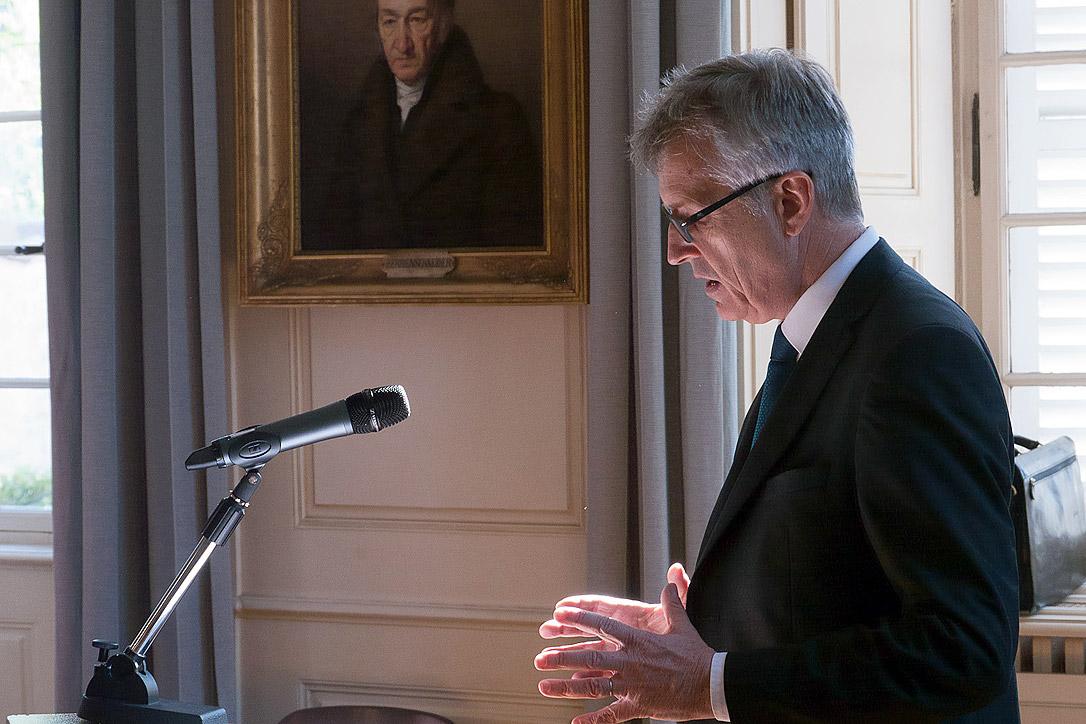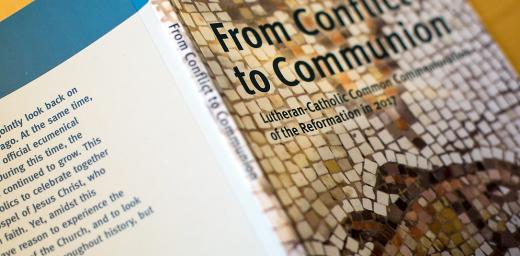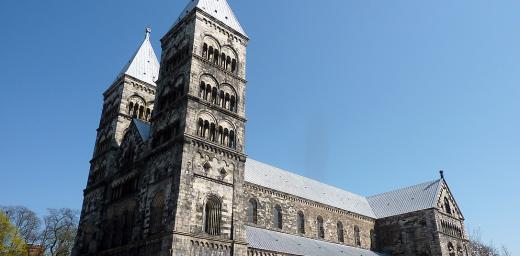50 Years of Shaping LWF’s Ecumenical Vision

LWF General Secretary Rev. Martin Junge. Photo: Andrew Wilson
Junge: ‘Many Good Reasons to Celebrate’ Support from Strasbourg Institute
(LWI) - The Lutheran World Federation (LWF) General Secretary Rev. Martin Junge has paid tribute to the Institute for Ecumenical Research at Strasbourg for supporting and shaping LWF’s ecumenical dialogues over the past five decades.
Speaking at the institute’s 50th anniversary celebrations on 22 April, Junge commended the theological center for its innumerable accomplishments and valuable support that have significantly contributed to the strong ecumenical vocation that is one of LWF’s hallmarks.
“Outstanding support has been provided to all the LWF’s bilateral dialogues and some impressive milestones were achieved thanks to the institute’s active and committed support,” the LWF leader said at the anniversary event.
Junge highlighted the vision of “unity in reconciled diversity” and the notion of “differentiated consensus” as important specific approaches to ecumenical dialogues that have been developed from research and discussions at the Strasbourg institute.
The institute’s accomplishment include the Joint Declaration on the Doctrine of Justification, signed with Roman Catholics in 1999, the Mennonite Action and its foundational document Healing of Memories – Reconciliation in Christ in 2010, and more recently the Lutheran–Roman Catholic document, From Conflict to Communion, on LWF’s ecumenical approach to the 500th anniversary of the Reformation in 2017.
Junge underlined the institute’s role during the long preparation process for the dialogue with the Orthodox churches, its active involvement in the Reformed-Lutheran dialogue, and the critical groundwork it carried out for the dialogue with the Pentecostals.
“There are many good reasons for celebrating the institute’s 50th anniversary … beyond the fact of having reached five decades of existence,” he said.
Unity of the Church: A Core Calling
LWF’s decision in 1963 to establish what was first known as the Foundation for Interconfessional Research came prior to its first bilateral dialogues. Today, the Institute for Ecumenical Research consists of a multinational team of theologians who provide theological analysis and advice to churches in their efforts to understand and articulate the visible unity of the Church.
In his address, Junge said the establishment of the original foundation stemmed from LWF’s desire to express its belief that confessional theology does not stand in opposition to the quest for unity in the body of Christ, but constitutes the foundation for Lutheran ecumenical engagement.
“For us in the LWF, unity remains a core calling, which we want to continue to pursue, both with a long-term vision and with what I would like to call a ‘prophetic impatience,’” he emphasized.
“In times like these, when fragmentation and the mentality of withdrawal and segregation seem to be the order of the day and affect even the churches, I believe in the ecumenical endeavor to carry a prophetic message: No, we are not comfortable with giving in to fragmentation and segregation.”
Responding to Existential Questions
The search for church unity exists in a context that is also marked by healthy impatience, Junge noted. When people nurturing their faith in inter-confessional families express their “huge pain and discouragement […] as separated churches at separate communion tables, how does this inform the overall setup of our ecumenical engagement?” Junge asked. There is a whole range of “different questions” and “different” angles on how to receive the gift of unity that needs to be articulated in the ecumenical dialogues, he added.
The general secretary said the evolving global context since the 1960s is also true for the church. There is a significant shift from one or a few critical centers of influence to many centers which are occasionally competing, cooperating, connected or disconnected and sometimes in “painful communication breakdown.” He argued that the next 50 years of ecumenical research should include a perspective on how the structure and methodologies of theological discourse relate to polycentrism and the variety of cultural contexts in which Christians express their faith.
Global Church
The institute’s current and former staff, representatives of LWF’s ecumenical partners and theologians from across the world attended the jubilee celebrations. Speakers at the 50th anniversary event included Bishop Brian Farrell, secretary of the Vatican’s Pontifical Council for Promoting Christian Unity; Dr Christos Filiotis, Greek Orthodox Church in Strasbourg; Lutheran Bishop Dr Michael Bünker, General Secretary of the Community of Protestant Churches in Europe (CPCE); and Mennonite church leader Rev. Dr Larry Miller, General Secretary of the Global Christian Forum.
The CPCE Vice-President and President of the Federation of Swiss Protestant Churches Rev. Dr Gottfried Locher preached at the worship service held at the St Thomas Church in Strasbourg.
Württemberg [Lutheran] Bishop Dr Frank O. July, LWF Vice-President for Central Western Europe and the Strasbourg Institute director, Rev. Dr Theodor Dieter, presided at the jubilee’s opening. Other guest speakers at the day’s events included Lutheran Bishops Dr Heinrich Bedford-Strohm (Bavaria, Germany and Dr Ndanganeni P. Phaswana (South Africa), and Dr Cecil M. Robeck, United States, representing the Pentecostals.





